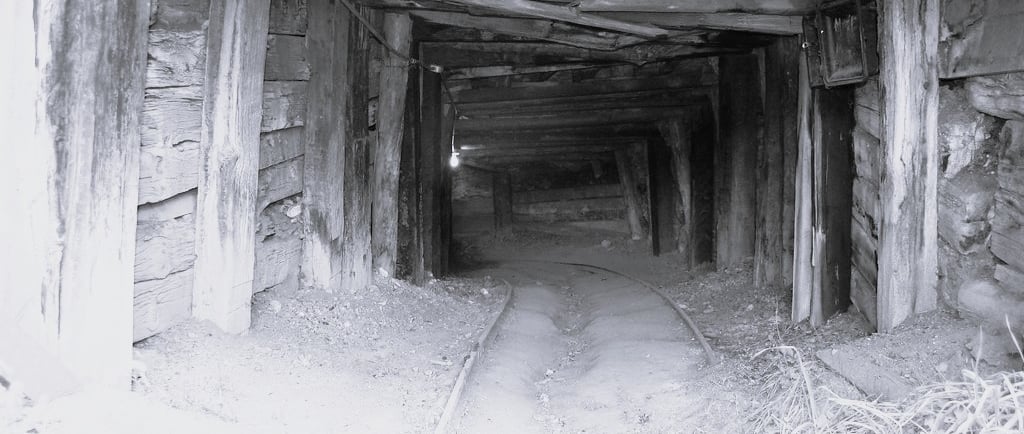The Black Lung Gospel
SHORT FICTION
By Raymond Brunell
9/10/2025


The mountain let out a breath, deep and lying. A groan rolled up through the shale, low and hollow, like a man waking up from a nightmare he can’t quite forget. Then a hush. Then the coughing—wet, rattling, echoing off the walls.
Down in the ridge’s throat, where the air tasted of rust and sweat and old fear, the first man spat blood onto the coal. Preacher called it communion now. He called everything that, ever since the church burned, and his congregation turned away. Down here, in the dark, he was still Preacher—if only because someone had to be.
The mine was just a wound in Blackbriar Ridge, hidden by kudzu and rotting boards. No permits, no maps. Just a shaft punched into stone, timber sagging like rotten teeth, the kind of place you only work if you need money badly or can’t go anywhere else.
Five men went down that morning. Six would come up. One would be carried. But not yet.
First, a tremor—a warning that crawled up their boots. Then a snap overhead, sharp and mean, like a rifle shot in a church. Then the roar, stone, dust, and panic all at once.
“Run!” someone shouted—maybe Preacher, maybe nobody. The word was half-choked with dust.
They tried. The tunnel closed in, air thick with grit and mule shit and something like burning hair. Shale crashed down, flattening the mule, cart buckling, coal spilling like a broken offering. The smell of blood and fear and old rot filled the air, thick enough to taste.
The roof started to come down. Not all at once—never all at once. Stone fell in waves, wood splintered, the world shrinking to noise and darkness and the hot sting of panic. Something smashed into Preacher’s ear—sharp pain, warm blood. He barely noticed. He was busy breathing and trying not to scream.
When the collapse ended, silence pressed in. Not true silence—just the drip of water, the groan of beams, men gasping for air.
And then, the coughing. One cough, then another, then a whole choir of it. The black lung gospel.
They were buried, but not dead. Not yet. Pinned in a pocket of air, darkness behind and ahead. Three lamps flickered, barely enough—ton after ton of rock between them and the world.
Preacher slumped against the wall, blood sticky on his earlobe. Silas was already at the rubble, clawing with his bare hands, muttering about debts and how the mountain always collected. He wasn’t strong, just desperate. “Gotta get out,” he rasped, “gotta get out, I can’t go back to owing.”
“Stop,” Preacher said.
“Ain’t stoppin’,” Silas snapped.
“You’ll bring more down. Then we’re all dead.”
Silas kept digging anyway, breath coming fast like an animal in a trap.
Preacher let him. Down here, nothing else mattered—not the sermons, not the wife who’d left, not the daughter who’d stopped saying his name—only air. And the air was running out.
Eli coughed first. Big man with ruined knees, the kind of guy who’d played tackle until his body gave out. He hacked so hard it sounded like he might split in two. “Just want to see my boys again,” he whispered, like he was saying it to the walls.
Preacher tried to laugh, but it came out dry and broken. “He’s not here, Eli.”
“He’s everywhere,” Eli hissed, eyes wild and scared.
“Faith don’t dig us out,” Silas muttered.
“Maybe not. But it’s all we got.” Preacher’s own voice sounded thin.
They quieted, listening to the mountain's shifting sounds. Shadows jittered on the walls, stretching long and thin. The air thickened, pressed in. Preacher’s head spun, mind drifting to flames, ledgers, faces lost to smoke and time.
He woke to Eli’s ragged breathing, the big man curled up, chest rattling like an empty canteen. “Eli,” Preacher whispered, crawling over. “Stay with me.”
Eli’s eyes fluttered. “Preacher,” he wheezed, and then coughed again—wet, final. Preacher held him up as he convulsed, then sagged. Eli’s skin was cold. His eyes stared past Preacher, already far away.
“Silas,” Preacher called.
“What?” Silas didn’t stop digging, fingers bloody now.
“Eli’s gone.”
Silas just dug faster, the scratching frantic.
Time blurred. The lamps flickered out. Preacher was alone with the dark and the sound of Silas digging, the smell of blood and dust and coal thick as sin.
Then, a shift—a faint breeze, barely there, dry and cool. Preacher crawled toward it, hands scraping raw, tasting blood and grit and something bitter on his tongue—communion, he thought—the price of survival.
A pinprick of light appeared. Silas was there, face gaunt, eyes burning with something fierce. “We’re getting out,” he croaked.
They pushed through, stumbling into sunlight. The mine behind them was gone, grass blackened, and the world had changed.
Preacher dropped to his knees, blood on his hands, the taste of coal still in his mouth. Silas stood, shoulders hunched.
“What now?” Preacher asked, voice shaking.
Silas looked at him, empty and full. “We made it out.”
The black lung gospel rattled in Preacher’s chest, a hymn for the lost. Sunlight stung his eyes, the blood on his hands dark and sticky. He wondered if this was a sign of grace or just another form of penance.
BIO: Raymond Brunell writes literary speculative and realist fiction that blends magical realism with the grit of lived experience. His work often explores silence, survival, and the fractures of memory, centering characters on the margins of visibility. Known for prose that is sensory, precise, and unflinching, Brunell's stories examine what lingers in the dark—whether tenderness, violence, or both.
Follow on Social
Literary Garage: Storytelling with grit, heart, and no off-ramp.
© 2025. All rights reserved.
Connect


editor@literarygarage.com
Follow us on Substack for updates and news
Clicking thE SUBSTACK link will direct you to an external website for our Substack feed. The content and privacy practices of Substack are not controlled, and no responsibility is taken for any issues that may arise on the platform.
